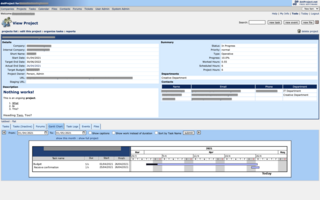
Kodi is a free and open-source media player software application developed by the XBMC Foundation, a non-profit technology consortium. Kodi is available for multiple operating systems and hardware platforms, with a software 10-foot user interface for use with televisions and remote controls. It allows users to play and view most streaming media, such as videos, music, podcasts, and videos from the Internet, as well as all common digital media files from local and network storage media.

IntelliJ IDEA is an integrated development environment (IDE) written in Java for developing computer software written in Java, Kotlin, Groovy, and other JVM-based languages. It is developed by JetBrains and is available as an Apache 2 Licensed community edition, and in a proprietary commercial edition. Both can be used for commercial development.
This article outlines the general features commonly found in various Internet forum software packages. It highlights major features that the manager of a forum might want and should expect to be commonly available in different forum software. These comparisons do not include remotely hosted services which use their own proprietary software, rather than offering a package for download which webmasters can host by themselves.
Laminas Project is an open source, object-oriented web application framework implemented in PHP 7 and licensed under the New BSD License. The framework is basically a collection of professional PHP-based packages. The framework uses various packages by the use of Composer as part of its package dependency managers; some of them are PHPUnit for testing all packages, Travis CI for continuous Integration Services. Laminas provides to users a support of the model–view–controller (MVC) in combination with Front Controller solution. MVC implementation in Laminas has five main areas. The router and dispatcher functions to decide which controller to run based on data from URL, and controller functions in combination with the model and view to develop and create the final web page.

dotProject is a web-based, multi-user, multi-language project management application. It is free and open source software, and is maintained by an open community of volunteer programmers.

Aptana, Inc. is a company that makes web application development tools for use with a variety of programming languages. Aptana's main products include Aptana Studio, Aptana Cloud and Aptana Jaxer.
Qcodo is an open-source PHP web application framework which builds an object-relational model (ORM), CRUD UI pages, and AJAX hooks from an existing data model. It additionally includes a tightly integrated HTML and JavaScript form toolkit which interfaces directly with the generated entities. It is a robust, comprehensive framework which can be utilized by small and large Web applications alike.
MODX is an open source content management system and web application framework for publishing content on the World Wide Web and intranets. MODX is licensed under the GPL, is written in the PHP programming language, and supports MySQL, MariaDB and Percona Server as the database. It was awarded Packt Publishing's Most Promising Open Source Content Management System in 2007.

Spring Roo is an open-source software tool that uses convention-over-configuration principles to provide rapid application development of Java-based enterprise software. The resulting applications use common Java technologies such as Spring Framework, Java Persistence API, Thymeleaf, Apache Maven and AspectJ. Spring Roo is a member of the Spring portfolio of projects.

Nette Framework is an open-source framework for creating web applications in PHP 5 and 7. It supports AJAX, DRY, KISS, MVC and code reusability. The original author of the framework is David Grudl, but further development is now maintained by the Nette Foundation organization. Nette is a free software released under both the New BSD license and the GNU GPL version 2 or 3.

Ember.js is an open-source JavaScript web framework that utilizes a component-service pattern. It allows developers to create scalable single-page web applications by incorporating common idioms, best practices, and patterns from other single-page-app ecosystem patterns into the framework.
ASP.NET Core is a free and open-source web framework and successor to ASP.NET, developed by Microsoft. It is a modular framework that runs on both the full .NET Framework, on Windows, and the cross-platform .NET. However, ASP.NET Core version 3 only works on .NET Core, dropping support of the .NET Framework.

Pydio Cells, previously known as just Pydio and formerly known as AjaXplorer, is an open-source file-sharing and synchronisation software that runs on the user's own server or in the cloud.
Kopano is an open-source groupware application suite originally based on Zarafa. The initial version of Kopano Core (KC) was forked from the then-current release of Zarafa Collaboration Platform, and superseded ZCP in terms of lineage as ZCP switched to maintenance mode with patches flowing from KC. Kopano WebApp similarly descended from Zarafa WebApp. Since October 2017, Kopano Core is also known more specifically as Kopano Groupware Core, since Kopano B.V. developed more products that were not directly requiring groupware components.

The Pop PHP Framework a free and open source PHP Web framework that was created by Nick Sagona. It is distributed under the BSD License and hosted on GitHub. The framework is intended to be utilized for rapid application development, with an emphasis on web applications.

Flarum is Internet forum software written primarily in PHP, and a combination of JavaScript and TypeScript for its user interface. It was created as part of a merger of two existing forum software, FluxBB and esoTalk, and their two main developers, Franz Liedke and Toby Zerner.










